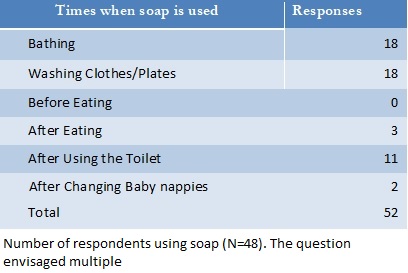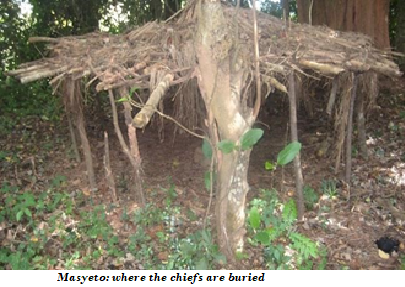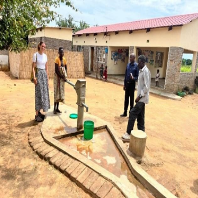march2018newsletter
Hygiene practice and behaviour is very low. None of the respondents we asked uses soap before eating while only 21% use soap after using the toilet. Likewise, the use of soap after changing baby nappies was surprisingly low (see table).

Similar studies in urban areas have revealed low hygiene behavioral practices. For example, Manda (2009) found that only 2% washed hands before eating despite soap being available. When it comes to the sources of water, the results show that the main source for bathing and washing the clothes and plates is the lake.
For drinking and cooking the main source is the borehole in many of the villages. Almost everyone stores drinking water and most of them use pails for storing. Therefore, interventions that can prevent diseases such as cholera or dysentery are needed in the following areas:

Religion during disasters: Wounding or Healing?
Religion in Malawi has been used positively and negatively during disaster. In Malawi there are three major religions. In this article, I reflect on how African Traditional Religions, Islam and Christianity have been both wounding and healing in times of disaster.
Positively, religions use prayer to deal with disaster. African Traditional Religions consult spirit beings in times of drought for rains to come.
This is positive in that it strengthens hope among the believing community that there can be light at the end of the tunnel. African traditional prayers have been linked to bringing rain.
Christians have also prayed to end draught. In the late 19th Century, we have a classical example where Angus Elmslie, a medical doctor and later an ordained minister of Livingstonia Mission prayed for the rains. The rains fell soon after the prayers (Elmslie, 1886). Indeed, it was because of this incident that Chief Mbelwa granted Livingstonia Mission a place at Njuyu for a mission station. This was especially powerful because African traditional prayers did not bring an end to the two months’ drought that had struck the land. In the incident at Njuyu, Chief Mbelwa and his followers had sacrificed cattle to the ancestral spirits so that the rains would come, but this did not happen. Other examples, where African Traditionalists offer prayers to end drought in Malawi are many. In Misuku Hills among the Sukwa, traditional prayers are made to the ancestral spirits of the departed chiefs at their graveyard to end draught. Mungoma is one area where such prayers are done. Beer is used as sacrifice to the spirits in the prayers. The place where the chiefs are buried is the Masyeto (Gadama, 2010). Rain making prayers are also done at Chikang’ombe among the Tumbuka in Rumphi. Prayers are made to the nature Spirit that inhabits the mountain (Ncozana 2002). In the Center such prayers are made at for example, the Chisumphi Cult. Here, prayers are made to ancestral spirits (Phiri, 1997). In the South of Malawi, prayers are made at the Bimbi Cult among mainly the Yao (Amanze, 2002). Another positive element in the two religions is their teaching on conserving nature which is key in preventing.

